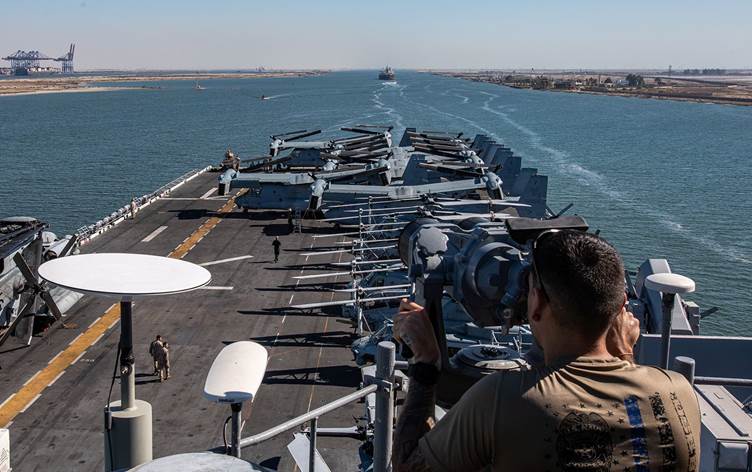
Over 3,000 military personnel arrived aboard two warships in the Middle East, the US Navy said on August 7, 2023. Photo: U.S. Naval Forces Central Command/Twitter
ERBIL, Kurdistan Region - The US Navy on Monday said that over 3,000 military personnel arrived aboard two warships in the Middle East, days after Washington said it would reinforce its deployment to deter vessel seizures by Iran.
The thousands of US sailors and Marines entered the Red Sea on Sunday as part of a pre-announced deployment by the Department of Defense. They arrived aboard the USS Bataan and USS Carter Hall, a statement by the Navy said.
The new “bring to the region additional aviation and naval assets, as well as more U.S. Marines and Sailors, providing greater flexibility and maritime capability” to the existing fleet, the statement added.
US officials said last week that Marines and troops aboard its commercial tankers to deter Iran from seizing its ships in the Strait of Hormuz. Around a fifth of global crude oil passes through the Strait of Hormuz, a key waterway between Iran and Oman.
The US military says Iran has seized or attempted to take over almost 20 international ships crossing through the Gulf waterways over the past two years. Tehran claims the vessels have been detained for committing shipping violations. On July 5, the US military said it had prevented attempts by the Iranian navy to seize two commercial tankers in the Gulf of Oman.
Iran’s Revolutionary Guard Corp (IRGC) on Saturday announced it was reinforcing its own navy with drones and 1,000km range missiles. Iran’s state-run IRNA reported that various types of “reconnaissance, intelligence, offensive and combat drones, support and command vehicles” were among the new additions to the IRGC Navy’s fleet.
Last month, Washington deployed F-16 and F-35 fighter jets, a destroyer, around 3,000 personnel as well as other warships to the region in response to Iran’s harassment at sea.








Comments
Rudaw moderates all comments submitted on our website. We welcome comments which are relevant to the article and encourage further discussion about the issues that matter to you. We also welcome constructive criticism about Rudaw.
To be approved for publication, however, your comments must meet our community guidelines.
We will not tolerate the following: profanity, threats, personal attacks, vulgarity, abuse (such as sexism, racism, homophobia or xenophobia), or commercial or personal promotion.
Comments that do not meet our guidelines will be rejected. Comments are not edited – they are either approved or rejected.
Post a comment